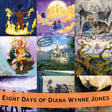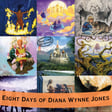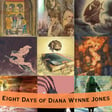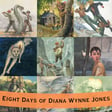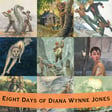
S2 Bonus Episode 2 - DWJ Shorts of the 70s and 80s
"She has tremendous talent, of course, or she couldn’t do it at all, but I do sometimes feel that she—well—she repeats herself. Put it like this: I think maybe Carol doesn't give herself a chance to be herself any more than she gives us."
Endless questions, out-of-control characters, silly adults and weird bad dads: this week we're discussing the playground of ideas that makes up DWJ's short fiction of the seventies and eighties.
Titles discussed include "Carruthers" (1972), "Auntie Bea's Day Out" (1978), "The Fluffy Pink Toadstool" (1979), "The Sage of Theare" (1982), "Warlock at the Wheel" (1984), "Dragon Reserve, Home Eight" (1984), "No One" (1984), "The Plague of Peacocks" (1984), "Carol Oneir's Hundredth Dream" (1986), "Enna Hittims" (1987), "The Fat Wizard" (1987), "The Green Stone," (1988), and "The Master" (1989). Transcript available here.
Please note: we've postponed recording our Q&A episode for the eighties until September 25th, so if you understand what's happening in 'The Master,' please write in and tell us!
